When we look at our financial planning model, a lot of clients say something like, ‘well, I’m never going to make it that long anyway.’
According to Society of Actuaries, more than half of Americans underestimate their life expectancy and that their financial planning time horizons are too short.
When asked how long a person their age and gender was expected to live, 40 percent of respondents gave answers that were five or more years less than their life expectancy. Another 20 percent underestimated their life expectancy by between two and four years.
I have sympathy for that mentality because I share it to some degree. About a decade ago, I did an online life expectancy calculator for my wife and it said that her life expectancy is 116, so regardless of what happens to me, I’ve got to plan for a long retirement.
Last night, I found an online life expectancy calculator from Met Life (found here) that asked a few basic health questions in addition to the general age and gender. (Now my wife’s life expectancy is only 102 – having kids and living with me for the last decade took 14 years off of her life!)
Life expectancy is a tough concept for a lot of people because they think that it’s the year they are expected to die. That’s not right. Your life expectancy is the age that the odds of you living beyond is a coin toss.
The following chart helps illustrate the idea:
This shows that if you are a man, age 65 years old today, there is a 78 percent chance that you will live to age 75. There is a 42 percent chance that you will live to 85 (which means that the life expectancy is somewhere between ages 80 and 85), and the odds of living longer than 100 are about one percent.
As we all know, the numbers look better for women. At age 90, only one in five of today’s 65 year old men will still be alive, but one in three women will still be alive.
The most interesting data, in my view, is the gray column for each age bracket, which shows that the life expectancy for the average couple is longer than the life expectancy for either one of the spouses individually.
While researching this article, I ran across a book by the CEO of the American Psychological Association titled, ‘Emotional Longevity: What REALLY Determines How Long You Live.’
Obviously, I haven’t read it, but I gathered that he found six factors that influence life expectancy and while some were familiar to me, others were not.
They included positive thinking, a strong social network (especially marriage), personal achievement, meaning and faith, stress and your gene pool.
The things that your parents told you to do – be kind, eat well, exercise, relax and do your best – help you live a longer life. If only it were easy to do all of those things successfully, we’d all live forever!



